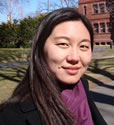 |
Lihong Shi, Ph.D. – Assistant Professor of Anthropology at Case Western Reserve University |
| Friday February 5, 2016 12:30-1:30 p.m. Dampeer Room Kelvin Smith Library Case Western Reserve University Dear Colleagues: In 1979, Deng Xiaoping announced one of the more dramatic examples of government policy in recent history: one child per family. Yet in order to predict the future and the effect of the policy change, we should first understand the past and present. Lihong Shi’s research has focused on why peasant couples in rural Northeast China, who were allowed to have a second child if the first was a girl, often choose not to try to have the son that, under traditional norms, they would have wanted. She will discuss how the one-child policy was formulated and implemented, reactions of the Chinese population to how it was implemented, the demographic consequences and social impact of the policy, and what the future may bring. All best regards, About Our Guest Lihong Shi studies reproductive politics and family and gender relations, particularly reproductive choice and family change under China’s birth-control policy. She examines an emerging reproductive choice in rural China where a large number of couples have decided to have only one daughter even though the modified policy allows them to have a second child. By delving into the socioeconomic factors contributing to this drastic reproductive decision, she looks at significant changes occurring within the Chinese families. She is also interested in demographic consequences of China’s birth-control policy, such as population aging and sex ratio imbalance. Where We Meet The Friday Public Affairs Lunch convenes each Friday when classes are in session, from 12:30 p.m. to 1:30 p.m. Our programs are open to all and no registration is required. We usually meet in the Dampeer Room of Kelvin Smith Library. The Dampeer Room is on the second floor of the library. If you get off the elevators, turn right, pass the first bank of tables, and turn right again. Occasionally we need to use a different room; that will always be announced in the weekly e-mails. Parking Possibilities The most convenient parking is the lot underneath Severance Hall. We regret that it is not free. From that lot there is an elevator up to street level (labeled as for the Thwing Center); it is less than 50 yards from that exit to the library entrance. You can get from the Severance garage to the library without going outside. Near the entry gates – just to the right if you were driving out – there is a door into a corridor. Walk down the corridor and there will be another door. Beyond that door you’ll find the entrance to an elevator which goes up to an entrance right inside the doors to Kelvin Smith Library. Schedule of Friday Lunch Upcoming Topics and Speakers: February 12: Let’s Talk About Lincoln. With Joseph White, Ph.D., Luxenberg Family Professor of Public Policy at Case Western Reserve University. February 19: Criminal Justice Reform in Cuyahoga County. With Lewis R. Katz, John C. Hutchins, J.D., Professor of Law at Case Western Reserve University. February 26: Update on the Presidential Campaign. With Justin Buchler, Associate Professor of Political Science at Case Western Reserve University. ***Alternate Location: Kelvin Smith Library, Room LL06*** March 11: Spring Break March 25: Hosting the Super B**l of Politics. With Brittany Williams, Senior Project Manager, Cleveland 2016 Host Committee. April 1: The Obama Administration and the Future of U.S. Manufacturing. With Susan Helper, Frank Tracy Carlton Professor of Economics and, former Chief Economist, U.S. Department of Commerce. April 8: Citizenship in a Divided America. With Mary Romero, Professor of Justice Studies and Social Inquiry, Arizona State University. Cosponsored by Academic Careers in Engineering and Science (ACES) program. Room to be determined. April 15: Money, Happiness, and Redistribution. With David Clingingsmith, Associate Professor of Economics. ***Alternate Location: Baker-Nord Center, Room 206, Clark Hall*** April 22: Germany, Asylum and the Future of Europe. With Kenneth F. Ledford, Associate Professor of History and Law and Chair, Department of History at Case Western Reserve University. |
